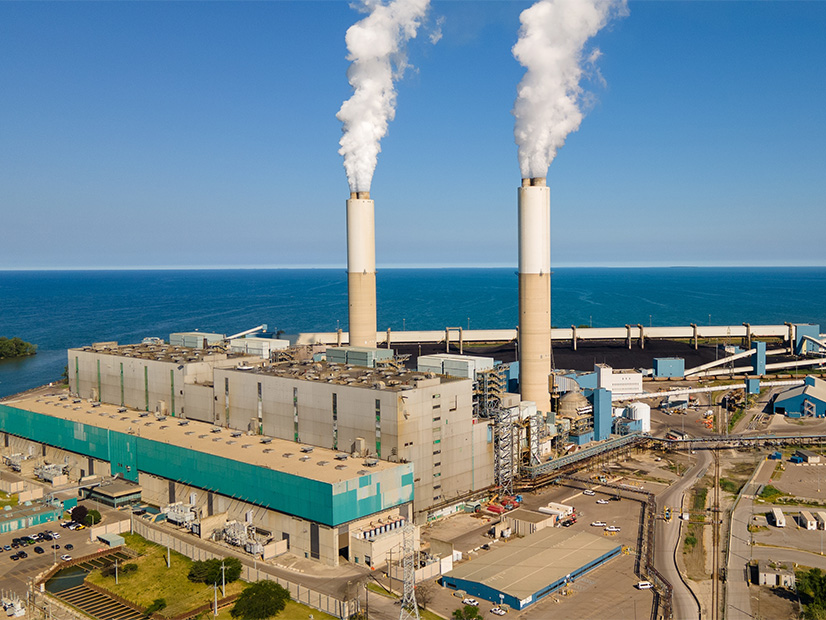DTE Energy announced an agreement with Michigan officials and environmental and clean energy groups Wednesday to accelerate its emission-reduction efforts, add more renewable power and phase out coal use by 2032.
Under the agreement on DTE’s 20-year integrated resource plan, the utility will cut its power plant emissions by 85% in the next nine years, with the utility committing to net-zero emissions by 2050.
The proposed agreement (U-21193) will have to be approved by Michigan’s Public Service Commission, which is expected to consider it at its next meeting July 26. The PSC staff was among the parties to the settlement, along with Michigan Attorney General Dana Nessel and 21 environmental and clean energy groups and labor unions.
Coal Retirements
The deal will end the use of coal at the Monroe plant, the nation’s fourth-largest, by 2032, three years earlier than DTE had previously announced. In addition, DTE will convert its only other coal-fired generator, the Belle River plant in St. Clair County, to natural gas.
DTE will also close the gas peaker unit (11 MW) at the shuttered River Rouge coal plant and diesel peaker (5 MW) at the retired St. Clair coal plant in 2024.
The company agreed to begin conversion of Belle River within three years and to seek federal funding for the work under the Inflation Reduction Act.
Monroe Units 3 and 4 will be retired by the end of 2028 and Units 1 and 2 by the end of 2032, assuming no regulatory orders to keep them open or designation by MISO as system support resources. DTE said it will propose how to replace the power from the 3,400-MW Monroe plant in its next IRP, due in 2026.
The company pledged to offer retraining for employees impacted by the coal plant retirements and offer “economic development opportunities” for host communities.
Coal represented 77% of the company’s generation in 2005. For 2022, the company’s generation mix was 54% coal, 18% nuclear, 14% natural gas and 13% renewables.
15,000 MW of Renewables
The agreement was developed over two years of discussions. (See DTE CEO Hints at Accelerating Coal Plant Closures.)
There was some grumbling that the agreement was not as aggressive as Consumers Energy’s plan to end the use of coal by 2025. But overall, the advocacy groups were satisfied with the agreement.
DTE said the IRP also calls for developing more than 15,000 MW of renewable generation by 2042 and more than doubling its current storage capacity with the addition of 780 MW by 2030 and more than 1,800 MW by 2042. The storage plan will include 220 MW at the Trenton Channel Power Plant, a former coal plant.
Also, the company also will seek 150 MW of new demand response through competitive bidding in time for MISO’s 2027/28 planning year.
The IRP indicated no need for generation capacity in the next five years.
Nessel touted several other parts of the agreement:
-
- $100 million in customer savings from securitizing at a lower rate more than $1 billion in early retired coal plant assets and reducing the return on equity on currently operating coal plants;
- DTE’s donation of $8 million for energy efficiency and renewable projects for low-income customers and $30 million to reduce arrearages;
- annual public disclosures of all contributions made by DTE and its regulated utilities that total $5,000 or more, including donations to tax-exempt 501(c)(3) and 501(c)(4) organizations;
- increasing DTE’s cap on distributed generation from 1% to 6%; and
- DTE’s allocation of at least $43.8 million to income-qualified electric energy waste reduction programs in 2024 and $53.8 million in 2025.
Activist groups said the agreement will reduce the health risks lower-income populations face from the power plants.
“This legal settlement commits DTE to an expeditious transition away from burning coal that is compelled by economics, public health and climate science,” said Earthjustice attorney Shannon Fisk. “With the Monroe coal plant — the third-largest climate polluter in the country — partially retiring in 2028 and fully retiring by 2032 (or possibly earlier), people in southeast Michigan will soon begin to breathe easier. Today’s settlement will accelerate the buildout of clean solar and wind power in Michigan, as well as battery storage, and it funds energy-efficiency programs.”
DTE CEO Jerry Norcia called the agreement “an investment in Michigan’s future.”
“We are grateful that 21 organizations from across Michigan have joined us in bringing our proposal one step closer to reality. This partnership and dedication have helped us build the best plan possible for our customers,” he said.




